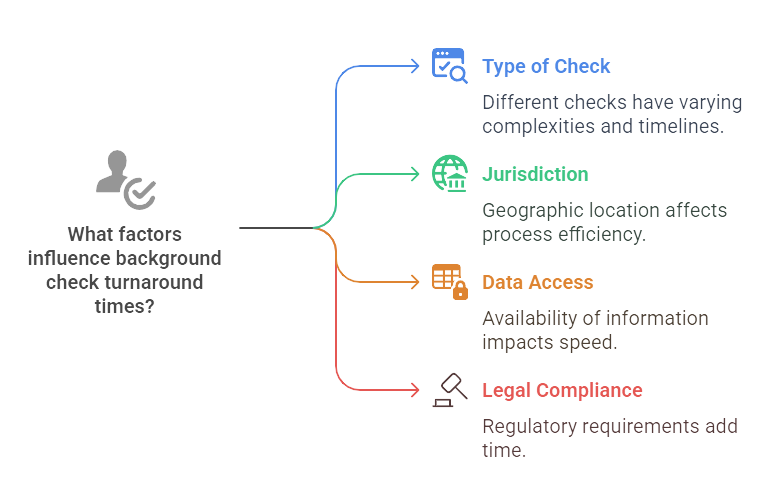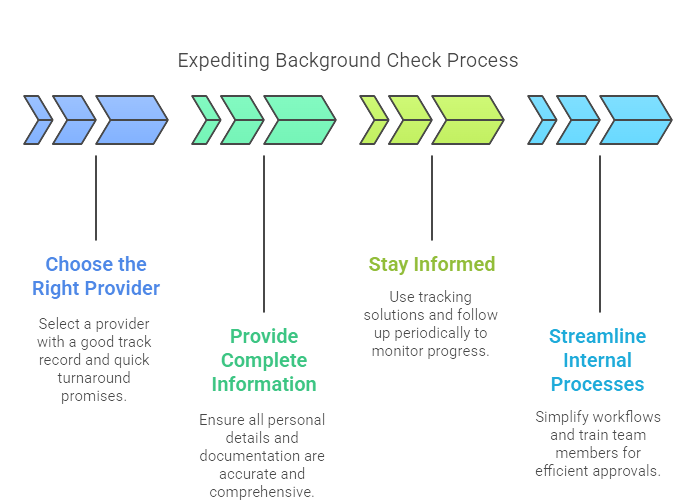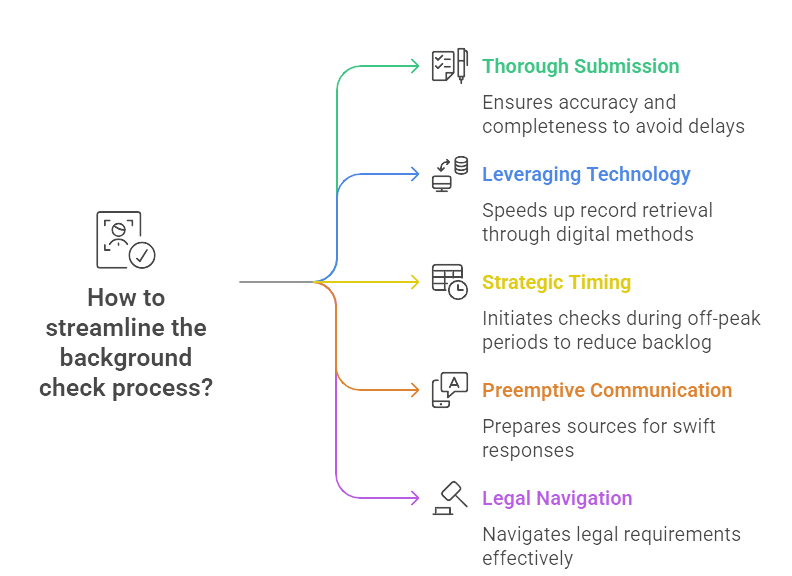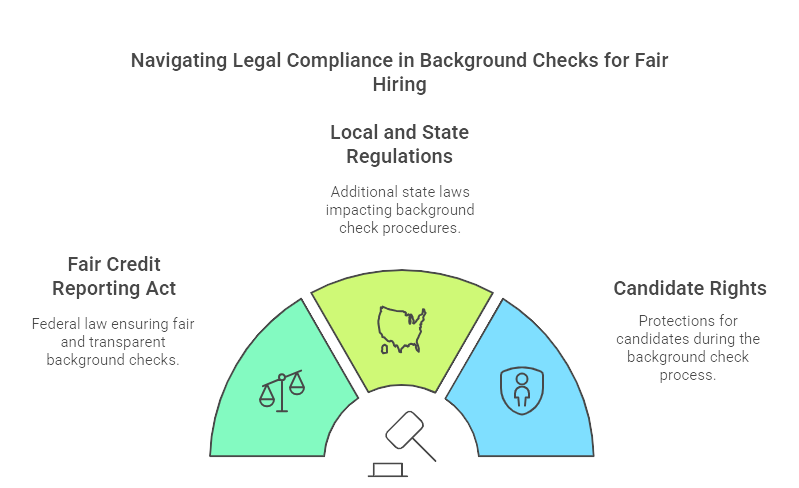Time is of the essence, especially in the hiring process. Whether you're a business owner, HR professional, recruiter, or job seeker, understanding background check turnaround times is crucial. This guide will explore the intricacies of these timelines, shedding light on what affects them and how to handle potential delays. Let’s get started.
Key Takeaways
- Background check turnaround times are essential for a swift and competitive hiring process.
- Several factors influence these turnaround times, including the type of check, jurisdiction, data access, and compliance with legal requirements.
- Typical turnaround times can vary widely. Criminal checks take a few hours to a few days, while education verification and employment history checks may take longer.
- To expedite background checks, choose a reliable provider, provide accurate information, stay informed, and streamline internal processes.
- Awareness of legal considerations, such as the Fair Credit Reporting Act and local regulations, is crucial for ensuring compliance and fairness in the hiring process.
Introduction
In today's fast-paced job market, speed is often synonymous with success. The ability to hire quickly and efficiently can make or break an organization. But amidst the rush to onboard new talent, the background check process can sometimes feel like a bottleneck. Understanding the turnaround times for these checks is more critical than ever.
So, what exactly are background check turnaround times? Simply put, this is the time it takes to complete a thorough investigation into a candidate's history, verify their qualifications, and ensure they're a good fit. These timelines matter because delays in background checks can stall the hiring process, leading to missed opportunities and a frustrated talent pool.
This guide aims to demystify the factors that influence background check turnaround times. We'll offer practical advice for managing these timelines effectively so you can keep your hiring process on track and competitive.
EXPERT INSIGHT: As an HR professional, what I've learned is that holding out for background checks isn’t just about timelines—it's about trust, timing, and candidate experience. There's an individual with each delayed report, eager and nervous about the next step in their life's work. I've lost top talent because the process took too long, and I've pulled in amazing hires because of a proactive follow-up. Background checks are more than a procedure—they're a step toward a better workforce. But the delay reveals something about the company, as well, just as the hire does. - Charm Paz, CHRP
What Are Background Check Turnaround Times?
In essence, background check turnaround times refer to the duration it takes from initiating a background check to completing and delivering its results. This timeline can vary significantly depending on multiple factors, which will be discussed later in this guide.
These timelines are crucial because they directly impact the hiring process. A speedy turnaround allows organizations to onboard new employees more quickly, reducing the risk of losing top candidates to competing job offers. Conversely, delays can lead to extended vacancy periods, increased workload on current staff, and potential loss of high-quality talent.
For employers and HR professionals, understanding and optimizing these turnaround times means efficiently making more informed hiring decisions. Awareness of these timelines can help job seekers manage expectations and prepare for potential delays.
Factors Influencing Background Check Turnaround Times
Type of Background Check
First, the kind of background check you're dealing with is a significant determinant. Simple criminal checks might wrap up in a few days, while more detailed verifications, like employment or education checks, can stretch out longer. Drug screenings or international checks? Those often add even more time into the mix. The bottom line is to know what type of check you need and expect timelines to vary accordingly.
Jurisdiction and Geographic Location
Geography isn't just about latitude and longitude—it's a massive factor in turnaround times. Different states, counties, and even individual courthouses have their processes and pacing. One county might have decades-long digital records, while another might shuffle through paper files. More remote or less technologically advanced areas can see significant delays because efficiency varies.
Access to Information
Then there's the matter of data access. If the required info is readily available in an excellent old database, expect things to move quickly. However, delays are almost inevitable if the information has to be extracted manually from a file or if special authorizations are needed. Expect hiccups when data is locked behind bureaucratic iron curtains or outdated systems.
Compliance with Legal Requirements
Ah, the legal hoops. Various regions have their own set of rules and regulations, which background check providers must comply with. Some areas are more stringent about privacy laws and require extra steps to ensure compliance, which invariably consumes more time. This is more than just a regulatory headache—it’s a time sink. Keep an eye on the legal landscape to manage timelines better.

Typical Turnaround Times for Common Background Checks
Navigating typical turnaround times for standard background checks is crucial for hiring. Knowing these timelines helps set realistic expectations and avoids unnecessary delays. Here’s what you can generally expect:
Criminal Background Checks
Criminal background checks are often at the forefront of pre-employment screenings. On average, these checks can take anywhere from a few hours to a few days. The speed largely depends on the search scope and the jurisdictions involved. For instance, county-level searches might be quicker than federal or international searches, which can take longer due to more complex data access.
Employment Verification
Verifying a candidate's employment history usually requires contacting previous employers and confirming tenure, job titles, and responsibilities. This process often takes 2 to 5 business days. Delays can occur if past employers are unresponsive or if additional follow-up is needed to clarify discrepancies.
Education Verification
Education verification is another critical component, ensuring the candidate's academic credentials are accurate. This typically takes 3 to 5 business days but can extend longer if verification requests are sent to international institutions or schools are unresponsive. Some institutions may require manual searches through archived records, which can add time.
Reference Checks
Reference checks involve contacting the candidate’s provided contacts for feedback on their previous job performance. Depending on the availability and responsiveness of the references, this process can take about 2 to 4 business days on average. Effective communication and prompt scheduling can help expedite this timeline.
Credit Checks
Credit background checks are generally quicker and often completed within a day. They involve obtaining credit reports from major credit bureaus and are straightforward as long as the necessary authorizations are in place. However, occasional delays can arise if additional verification of the candidate’s identity is needed.
Understanding these typical timelines allows for better planning and smoother transitions during the hiring process. By knowing what to expect, you can proactively address potential delays and ensure a more efficient and effective screening procedure.
How to Expedite Background Check Turnaround Times
When you're pressed for time and need to speed up your background check process, a few targeted actions can make all the difference. Here’s how you can ensure faster results without compromising accuracy or compliance.
Choose the Right Provider
Selecting a reliable background check provider is crucial. The right provider will have established processes, a robust network of data sources, and a good track record for speedy results. Look for providers with positive reviews and quick turnaround promises that align with real-world performance. Partnering with a reputable firm can shave days off your typical screening time.
Provide Complete and Accurate Information
Accuracy is your best friend when expediting background checks. Any missing or incorrect information can result in delays. Ensure that you provide comprehensive and accurate personal details and documentation upfront. Double-check names, dates, and other essential data before submission. The smoother the initial submission, the less likely you'll encounter hold-ups.
Stay Informed
Staying on top of the process helps you catch potential snags early. Many background check providers offer tracking solutions or regular status updates—use these features. If your provider doesn't provide this, don’t hesitate to follow up periodically. Being proactive can help you address issues swiftly and keep the process on track.
Streamline Internal Processes
Internal inefficiencies can also add time to the background check process. Simplify and standardize your internal workflows to remove bottlenecks. For example, have a clear protocol for requesting and reviewing background checks and ensure relevant team members are trained and ready to act promptly. Quick internal approvals and responses can significantly cut down the overall processing time.
These straightforward steps can help you expedite background check turnaround times, allowing for a more fluid and efficient hiring process.

Challenges and Solutions
Common Challenges
- Incomplete Information: Missing or incorrect details can slow the background check process. Incomplete forms or missing signatures are some of the most frequent culprits.
- Jurisdictional Variations: Different regions have different processes for record retrieval. Some jurisdictions rely heavily on manual records, leading to longer waiting times.
- Volume and Backlog: High volume periods, like hiring seasons, can create backlogs for background check providers, significantly delaying individual reports.
- Legal Restrictions: Some regions have strict privacy laws that can elongate the process of obtaining records and verifications.
- Third-party Delays: External entities such as former employers or educational institutions might not respond promptly, hampering the verification process.
Solutions
- Thorough Submission: Ensure all requested details are accurately provided at the outset. Double-check forms for completeness and accuracy before submission to avoid unnecessary delays.
- Leveraging Technology: Opt for providers that use digital retrieval methods where possible. Electronic databases can speed up record checks significantly compared to manual processes.
- Strategic Timing: If feasible, initiate the background check process during off-peak periods. This can help you avoid delays caused by high demand.
- Preemptive Communication: In advance, contact former employers, educational institutions, and other verifiable sources. Inform them of the impending requests to ensure they’re prepared to respond swiftly.
- Legal Navigation: Partner with a knowledgeable background check provider who understands the legal requirements of each jurisdiction. This can help you navigate complex legal landscapes more effectively.
Identifying and addressing these common challenges can significantly reduce background check turnaround times and streamline your hiring process. Proactive measures and clear communication can make a substantial difference.

Legal Considerations
Navigating the legal landscape of background checks is crucial to ensure compliance and fairness in the hiring process. Here's what you need to know:
Fair Credit Reporting Act (FCRA)
The FCRA is a federal law that governs how background checks must be conducted in the United States. This law ensures that:
- Notification and Consent: Employers must inform candidates if a background check will be conducted and obtain written consent.
- Access to Information: If the check results negatively influence employment decisions, candidates must be provided with important details, including a copy of the report and the opportunity to dispute inaccuracies.
Staying compliant with the FCRA is not optional. Non-compliance can result in hefty fines and legal troubles.
Local and State Regulations
Beyond federal laws, each state may have additional regulations that impact background check procedures. For example:
- Ban-the-Box Laws: Some states restrict when employers can inquire about criminal history, typically delaying these questions until after an initial interview or conditional job offer.
- Salary History Bans: Several states prohibit employers from asking about a candidate’s previous salaries, aiming to promote fair pay practices.
Understanding these variations is essential. Consulting legal experts or staying informed through state labor department updates can help maintain compliance.
Candidate Rights
Candidates have specific rights designed to protect their interests during the background check process. These include:
- Notification of Adverse Action: If a decision not to hire is based on the background check, candidates must be informed and allowed to address or correct any discrepancies.
- Access to Reports: Individuals have the right to see the information that the background check uncovered, promoting transparency.
- Dispute Inaccuracies: If there are errors, candidates can dispute inaccurate or incomplete information directly with the reporting agency.
Ensuring that these rights are upheld helps maintain compliance and fosters a sense of fairness and trust throughout the hiring process.

Frequently Asked Questions (FAQ)
Why do background checks take so long?
Background checks can take longer than expected due to various factors:
- Complexity of the Check: Some checks, like a thorough criminal background or international records search, require more time.
- Data Accessibility: Delays often occur when records are not digitized or demand manual retrieval from archives.
- Legal and Compliance Issues: Verifying information in certain jurisdictions may require compliance with local regulations, adding another layer of complexity.
- Volume: High requests can overwhelm service providers, causing slower processing times.
What can cause a delay in my background check?
Several elements can lead to delays:
- Incomplete Information: Missing or inaccurate details about the candidate can prolong the process.
- Unavailable Records: Some institutions or former employers may be slow to respond to verification requests.
- Holidays and Weekends: Non-business days can delay the response times from various institutions.
- Manual Processes: Some checks still rely on manual data entry and verification, which can extend turnaround times.
Can I do anything to speed up my background check?
Yes, you can take steps to expedite the process:
- Submit Accurate Information: Double-check the application to ensure all information provided is accurate and complete.
- Respond Promptly: Respond as quickly as possible if contacted for additional information or clarification.
- Choose a Reputable Provider: Select a background check provider known for its efficiency and reliability.
- Pre-emptive Documentation: Prepare necessary documents, such as previous employment records or educational certificates, that might be required during verification.
Are there background checks that can be done instantly?
Yes, certain background checks can be done very quickly:
- Instant Criminal Databases: Some providers have access to nationwide criminal databases that can instantly provide results.
- Credit Checks: These are typically fast and can often be completed daily.
- Basic Identity Verification: Simple verification checks can be processed quickly, with almost immediate results.
What happens after a background check is completed?
Once a background check is completed:
- Review Results: The hiring company or decision-maker will review the results.
- Further Action: If issues arise, the candidate might be asked for clarification or additional information.
- Decision Making: Based on the check, a decision regarding the candidate’s hiring will be made.
- Notification: Candidates will usually be notified of the outcome, and if the check is part of the legal onboarding process, they have the right to dispute inaccuracies if any are found.
Conclusion
In grasping the complexities of background check turnaround times, you've equipped yourself with valuable insights that can streamline your hiring process. Here are the key takeaways: understanding the factors that influence timelines can help you anticipate and mitigate delays, choosing a reliable service provider, and providing accurate information are critical steps to ensure efficiency, and staying proactive and informed can facilitate smoother background check experiences.
While it may be tempting to rush through this step, thorough background checks are indispensable for making well-informed hiring decisions. Patience and diligence in this phase can prevent future complications and ensure that you build a trustworthy and qualified team.
With these strategies in hand, you're well-prepared to navigate the intricacies of background check turnaround times, fostering an efficient and comprehensive hiring process. Stay proactive, stay patient, and stay informed. Your efforts will pay off in terms of the quality of hires and the smooth operation of your business.

GCheck Editorial Team
Meet the GCheck Editorial Team, your trusted source for insightful and up-to-date information in the world of employment background checks. Committed to delivering the latest trends, best practices, and industry insights, our team is dedicated to keeping you informed.
With a passion for ensuring accuracy, compliance, and efficiency in background screening, we are your go-to experts in the field. Stay tuned for our comprehensive articles, guides, and analysis, designed to empower businesses and individuals with the knowledge they need to make informed decisions.
At GCheck, we're here to guide you through the complexities of background checks, every step of the way.






